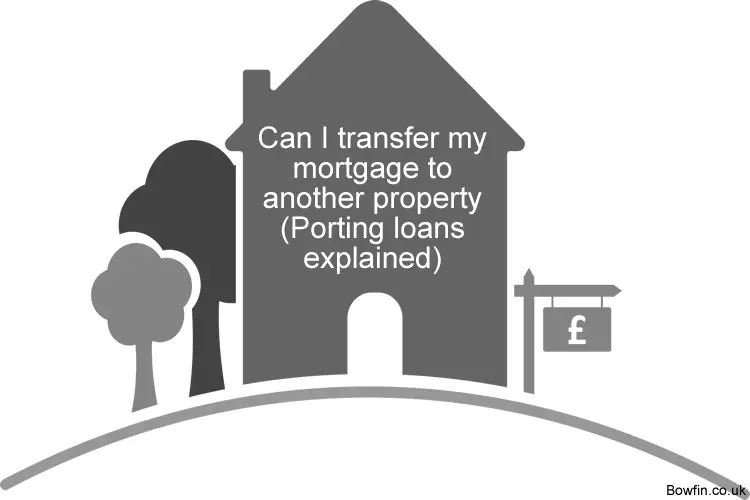Porting your mortgage to a more expensive property can be a good idea. But in doing so may involve fees and possibly a different rate. All lenders have their own special rules for transferring mortgages and how they apply rates to top-ups.

Can I transfer my mortgage to another property in brief:
You can transfer your mortgage to another property, but this requires your lender’s approval first. Your mortgage lender will need to value the new property and re-assess your affordability and ability to repay the loan, which is even if you have kept up your repayments to date.
Most mortgages in the UK are portable. This means that you can transfer your mortgage from your current property to your new home you’re purchasing.
Other considerations are that you may need to borrow more to buy this new property. There may also be fees to pay for the transfer. However, down-sizing may be a problem, depending on the loan to value calculation for the new property. So let’s find out more.
How to transfer your mortgage to another property
The best way to transfer your mortgage to another lender is to firstly take a look at your mortgage terms. If necessary, speak with your mortgage lender or alternatively, speak with your mortgage broker.
Most mortgages in the UK are portable. This means you should be able to transfer your current mortgage that’s secured against your present property to your new home.
Before you’ll be able to port or transfer your mortgage, your mortgage lender will want to value the new property. Also, there’s the very likely chance you may need to borrow more to secure it. This is especially true if your new property is a more expensive property than the one you currently live in.
Be aware also that there may be fees to pay for the transfer.
How does porting a mortgage work?
The process of transferring your mortgage from one property to another is called ‘porting‘.
This enables you to take your existing mortgage product with you when you move. By doing so you transfer it to the new property, but without having to pay early repayment charges.
But as already mentioned, there may be fees incurred for the transfer, which will likely include a valuation fee, legal costs and administration fees.
Is porting a mortgage worth it and why do it?
When you decide to move home, it’s a good idea to look around for a better mortgage deal than you currently have. I always recommend to use a mortgage broker for this, as they look at the whole mortgage market.
A mortgage broker will match the right mortgage to your personal circumstances and to the property you’re buying.
Is porting your mortgage a good idea?
However, whilst considering a new mortgage, you should begin by checking whether there are any penalties to pay on your existing home loan. This is likely if you took out a fixed rate or a discounted deal mortgage. If this is the case, most mortgage companies will include a penalty. This is to deter you from repaying your mortgage early where you’ve secured a good fixed rate mortgage.
If you discover that your mortgage has penalties is when it might be worth it to transfer it to another property. Penalties are likely to be fees and additional interest charges where you’re still in the ‘special offer period‘ of the loan.
If you don’t port your mortgage, and in order to be better off by moving mortgage provider, you’ll need to find a deal that’s sufficiently cheap to cover the cost of these penalties.
Do you have to pay a deposit when porting a mortgage?
When porting a mortgage, the same buying rules apply. All mortgage lenders have set lending criteria and if this includes lending up to a certain percentage of the home, you will have to pay a deposit to buy the next house.
When I port my mortgage can I top it up?
If you’re moving to a more expensive property you may be able to port your mortgage, but only for the current loan amount. But you should be able to keep the interest rate you are currently paying.
If however this loan amount isn’t sufficient to afford the new house, any extra must be paid for through a ‘top-up mortgage‘. However, this needs to be from the same lender, as you’re unlikely to find another mortgage company happy to lend on what’s referred to as a ‘second charge‘ at a good interest rate.
If you do need a top-up mortgage, you’ll end up with two separate loans, but with different end dates and likely different interest rates.
What about porting a mortgage to a cheaper house?
If you’re down-sizing and moving to a cheaper house, can you still transfer your mortgage? The answer to this question depends. Whether you’ll be able to transfer your mortgage to a cheaper property will revolve around the loan to value. This is better explained by way of an example.
Example of porting a mortgage to a cheaper house
Here are three examples of how mortgage porting works.
Example #1 of moving to a cheaper house
- Let’s assume your current home is worth £600,000 and you have an outstanding mortgage of £350,000.
- Also assume that your new house is worth £400,000.
- Then assume that the loan terms are a maximum loan to value (LTV) rate of 80%.
The LTV if the mortgage was ported to this cheaper house would be 87.5% (350,000/400,000). This would mean the transfer couldn’t take place.
Example #2 of moving to a cheaper house
Let’s assume all the details in the above example are the same, except that your outstanding mortgage is now £305,000 instead.
The LTV if the mortgage was ported to this cheaper house is now 76.25% and therefore would be acceptable by your mortgage lender.
Example #3 of moving to a cheaper house
Assuming the details are the same as in example #1 above, but the mortgage outstanding is £330,000.
For this to work, you’ll need to repay £10,000 of the mortgage before it falls below the 80% LTV threshold. That is, the maximum loan to transfer is £400,000 x 80% = £320,000.
If this is your scenario, check your mortgage terms. Most UK mortgage lenders allow for a certain percentage capital repayment each year that won’t cause the penalties to kick in. Many allow up to 10% repayment per year.
Assuming you’ve not already repaid the 10% back in the previous 12 months, you could repay the £10,000. £10,000 in proportion to £330,000 represents 3% of the loan (i.e. 10,000/330,000). This should therefore also work to transfer the mortgage to the cheaper house.
More Reading: What happens to your mortgage when you sell your house and buy another
What are the advantages of transferring your mortgage to another property?
There are a number of advantages of transferring your mortgage to another property, which include the following:
- In theory, it should be easier to arrange the transfer of your mortgage, as you’re dealing with the same provider as before. But see the conclusion below.
- You won’t have to research and compare mortgages from new lenders, although I recommend you do so.
- If you are selling your house during fixed term mortgage, it will avoid the early repayment penalties.
- You’ll not have to fill out lots of paperwork, as your lender already has all of your information. Although they will want an update on your affordability.
- Transferring your mortgage rather than changing mortgage lender can be a quicker process.
More Reading: How to deal with the stress of selling your house (How to avoid the stress)
What are the disadvantages of transferring your mortgage to another property?
As with anything where there are advantages, there are usually disadvantages too.
The disadvantages include:
- If your new house is more expensive and the current mortgage isn’t big enough to achieve the purchase.
- If you are moving to a cheaper house and you’re down-sizing, this may not be possible without repaying more than you’re permitted to avoid the penalties kicking in.
- When you check your original mortgage offer’s terms and conditions, you may not have the ‘porting‘ feature.
- If you port your mortgage, you keep the original mortgage terms, whereas there may be better mortgage offers on the market. But make sure the new mortgage terms and any savings you make, out-weigh the penalties you may incur.
- Your current mortgage lender may not lend on the type of house you’re buying.
- You no longer qualify for the mortgage. More and more customers are finding it harder to port their mortgage because they no longer qualify for the same product they qualified for previously.
In conclusion
There is the possibility that you will be rejected for your mortgage entirely. It is therefore worth doing some research in advance to see how your circumstances might affect your application to transfer your mortgage.
Have your circumstances changed significantly? Since the Mortgage Market Review in 2014 lenders will now look at your everyday expenses and how much debt you have outside of your mortgage.
If these have increased, but your household income hasn’t or perhaps you have had a new baby or bought a new car, you may find it harder to be approved to borrow the same amount as before.
Don’t take it as a given that you can transfer your mortgage.
I hope this article has helped on ‘can I transfer my mortgage to another property’
If this article has helped on ‘can I transfer my mortgage to another property’ please share it on your favourite social media site.
Also, if you have any questions or you need help, please feel free to comment below too. Alternatively, if you need more help, please feel free to contact us on our contact us page here. Or join the discussion and ask your question in the property forum.
More Reading: I Can’t Sell My House What Are My Options (If I live In The UK)?




